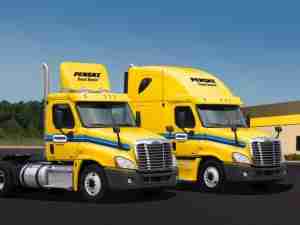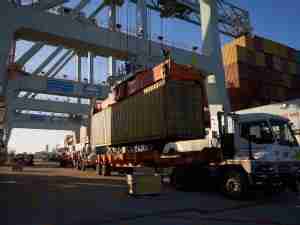In a few months time, Swedish truck-making giant Volvo AB will deliver its first all-electric model. The battery-powered eight-wheeler will ply the streets of Germany’s northern port city of Hamburg, picking up garbage.
While Chief Executive Officer Martin Lundstedt expects to go slow on the initial ramp-up, he sees the project as a harbinger for a rapid proliferation of battery-powered trucks to move goods and refuse around urban settings.
The race is on with big truck manufacturers including Daimler AB and Scania, as well as upstarts like Tesla Inc. and Chinese companies, to develop electric workhorses. Success in Hamburg would put Volvo on firmer footing in an emerging market that is proving so difficult to gauge that it has even sparked jibes between executives.
“What we see now is the beginning of a shift that will accelerate rather rapidly,” Lundstedt said in an interview at the Gothenburg headquarters of the world’s second largest truckmaker outside China.
Getting the technology right for electric passenger cars is already a challenge, but harder still is designing vehicles that can carry far heavier loads for long distances and without costly downtime for charging.
In an initial push, Volvo is focusing on moving relatively lighter loads around cities. The Swedish company earlier this year launched two models, and Lundstedt predicts “far more” than a quarter of trucks sold for city use are likely to run on electricity within five years.
This is because the costs of operating battery-powered vehicles for tasks like package delivery are set to drop rapidly, becoming the cheapest option by 2025, according to Bloomberg New Energy Finance.
The forecast shift to electric in the trucking industry is ushering in new competitors. Tesla is testing a heavy-duty truck with a 500-mile range and has said it will start deliveries next year.
Those ambitious plans have been met with skepticism in the industry. Daimler’s head of trucks, Martin Daum, has said that current batteries won’t be able to deliver the range and load capacity needed.
Tesla CEO Elon Musk answered with a good-natured retort on a May 2 conference call.
“He doesn’t know much about physics. I know him,” Musk said then. “I’d be happy to engage in a physics discussion with him. I actually studied physics in college.”
Lundstedt is more cautious, saying that while established truckmakers have knowledge and experience that is sometimes underestimated, he doesn’t want to risk looking foolish by deriding plans by Tesla or other newcomers.
Missing Train
“I think it’s dangerous to dismiss that,” he said. “You could easily end up in a long line of people who have missed the train after dismissing things as unrealistic.”
Volvo’s FE Electric truck destined for Hamburg can haul loads of 10 to 15 tons, slightly less than the comparable diesel version. When fitted with a 300-kWh battery, it has a range of 200 kilometers. It faces competition from Daimler’s Fuso brand, which has delivered up to 3.5-ton capacity electric eCanter trucks to customers in six cities. China’s BYD Co. has announced deals to deliver hundreds of garbage trucks at home and in Brazil.
Longer-haul electric trucks would be best-suited for heavily-plied routes such as the U.S. eastern coast, the Volvo CEO said. Combustion engines would still be needed for most transport across longer distances, where charging systems would be more costly to develop.
“If we want to reduce CO2, you should go for the applications where it makes the biggest difference, and where we have good technologies today,” he said. “That is to a large extent in urban environments.”

_-_28de80_-_9b2f972cdce64d5f7c8d952d74a16521db70a589_yes.jpg)






